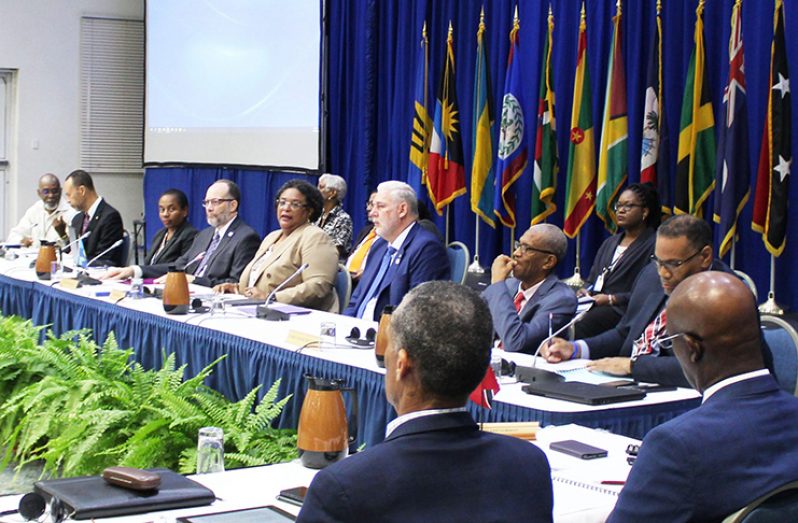…CCJ advises
MEMBER STATES of the Caribbean Community (CARICOM), under Article 27 (4) of the Revised Treaty of Chaguaramas (RTC) can opt out of a decision once the fundamental objectives of the Community, as laid now in the Treaty, are not negatively affected, the Caribbean Court of Justice (CCJ) said as it offered its first advisory opinion on the Freedom of Movement.
The opinion was offered by the CCJ last Wednesday, in response to a request by CARICOM Heads of Government for advice on two specific questions relating to freedom of movement within the Community.
In 2019, the Heads of Government took a decision to enlarge the list of CARICOM workers who were entitled to work freely within the Regional Bloc. That expanded list includes agricultural workers and security guards but the CARICOM Heads have acceded to requests made by the states of Antigua and Barbuda and St Kitts and Nevis to opt out of that decision for a period of five years.
But could a Member State lawfully opt out of such decision of the Conference? And secondly, could the principle of non-reciprocity allow nationals of any such Member State opting out to gain the benefits of the decision?
In response, the CCJ concluded that it was lawful for Antigua & Barbuda and St Kitts & Nevis to request an opt out of the obligations to accept agricultural workers and security guards as agreed by the Heads of Government. “It was also lawful for the Conference to grant the opt outs in all the circumstances. The said opt outs did not prejudice the fundamental objective of freedom of movement of skilled nationals,” the Court said in a statement.
In arriving at its conclusion, the CCJ explained that five conditions are needed for the effective implementation of an opted out.
“Firstly, one or more of the Member States must make a request to opt out of a decision as the states of St Kitts & Nevis and Antigua & Barbuda did respectively. Secondly, the decision maker must be a competent organ of the Community and here, there was no dispute that the Conference of Heads was a competent organ. Thirdly, the Conference must agree to the request of the Member State(s) to opt out of the relevant decision. It was also clear here that such an agreement was made and that the two Member States were permitted to opt out of the enlargement decision,” the CCJ summarized in a statement.
It stated too that in keeping with Article 27(4) of the RTC, the Member State opting out is entitled only to opt out of the obligations arising from the decision. Importantly, it said an opt out is permitted only if the “fundamental objectives” of the Community, as laid down in the RTC, are not prejudiced or undermined by the opt out, and in the cases of St Kitts and Nevis and Antigua and Barbuda, there was no fundamental breach of the objects of the RTC.
While the Court determined that freedom of movement was a fundamental objective of CARICOM, it also considered the facts that the opt out was made available to two Member States, each of which is categorised as a less developed country; and secondly, the duration of the opt out in each case was temporary.
Notably, the opted out related only to two categories of skilled nationals – agricultural workers and security guards.
In response to the second question, the Court said the opt-out mechanism ought to be treated as being non-reciprocal in character, and as such the principle of non-reciprocity applies to enlargement decisions. In other words, it means that nationals of Antigua and Barbuda and St Kitts and Nevis, who are security guards and agricultural workers, are entitled to enjoy the benefits of the enlargement decision.




.png)









